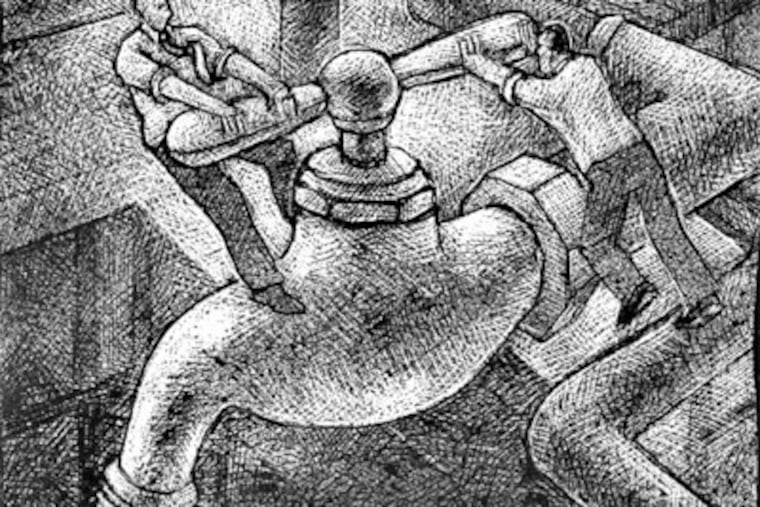Gas prices and the economy
I love my local Wawa. Great coffee. Even better - at least for an economist - it sells gasoline at prices uncannily consistent with the national average. I don't need the Energy Department's website to tell me about the average American household's financial pain. At Wawa, regular unleaded currently goes for $3.83 per gallon, not far from the all-time high of $4.11 reached during the summer of 2008. That's a lot of pain. Nothing is worse for our economy than rising energy prices. They act like a pernicious tax increase, forcing us to spend more filling up and leaving less for everything else. But unlike taxes, money spent on auto fuel doesn't pay teachers' salaries, pave roads, or lower the national debt. Indeed, much of it ends up in the Middle East.

I love my local Wawa. Great coffee. Even better - at least for an economist - it sells gasoline at prices uncannily consistent with the national average. I don't need the Energy Department's website to tell me about the average American household's financial pain. At Wawa, regular unleaded currently goes for $3.83 per gallon, not far from the all-time high of $4.11 reached during the summer of 2008. That's a lot of pain.
Nothing is worse for our economy than rising energy prices. They act like a pernicious tax increase, forcing us to spend more filling up and leaving less for everything else. But unlike taxes, money spent on auto fuel doesn't pay teachers' salaries, pave roads, or lower the national debt. Indeed, much of it ends up in the Middle East.
Every penny increase in the cost of a gallon of gas costs American consumers $1.25 billion over the subsequent year. With gas prices up almost 60 cents per gallon since the end of 2011, U.S. pocketbooks are set to take a hit of approximately $75 billion this year. By comparison, the 2 percentage-point cut in payroll taxes that took effect in January 2011 is worth about $100 billion. If gasoline goes much higher, the payroll tax break will essentially cover the higher cost of fuel.
Gasoline is indeed likely to go higher, and will probably reach a record high by mid-May, even if crude oil stays roughly where it is. Gasoline prices always rise at this time of year, because demand picks up as people begin to travel more, and refiners blend in summer additives to protect the environment. This year, moreover, refining capacity is in shorter supply; refiners have been shutting plants, seeing slimmer profits down the road. Two large Philadelphia refineries are only the latest examples.
Prices may rise as well for crude oil, as tensions rise in the Middle East. Along with the region's long-running problems, concern about Iran's nuclear program and a tightening embargo on that nation's oil exports could easily cause events to boil over. Saudi Arabia has picked up the slack in production so far, but the world's largest oil producer doesn't have a lot of excess capacity left. Neither does any other nation, so if anything else goes wrong the world could see an oil shortage. The risks have built a premium into oil prices that could easily grow. It's not hard to construct some pretty dark scenarios.
It is also worth noting that most of the recessions since World War II have been preceded by a spike in oil prices. The 1973 Yom Kippur War between Israel and its Arab neighbors led to global stagflation. The Iranian revolution led to an even more debilitating downturn in 1980 to 1982. And Iraq's invasion of Kuwait resulted in the global recession of 1990-91. Even the recent Great Recession was clearly exacerbated by record oil prices in the summer of 2008.
There isn't a lot that policymakers can do to lower fuel costs near-term. Using the Strategic Petroleum Reserve might help for a short while, but the SPR should be used only in times of real emergency. Some states are talking about temporarily cutting gas taxes, but, given the states' financial problems, this tactic is unlikely to go very far.
In the long run, there are lots of things policymakers can and should do to make the nation more energy independent. Promoting the use of natural gas as transportation fuel seems like a slam dunk; natural gas is plentiful, cheap, and produced at home, including here in Pennsylvania. Natural gas isn't clean, but it is cleaner than oil. Policymakers should focus on facilitating the substantial investment needed in natural gas-powered vehicles and fueling stations.
Unlocking the shale oil produced in North Dakota and Canada also makes sense. Environmental concerns should be addressed, but, given its value, shale oil will be produced one way or another. Best to do it in an environmentally coherent way, beginning with a rational policy on the pipelines needed to move oil from producers to consumers.
I'm not a fan of the energy industry's many tax breaks, both for fossil fuel and for "green" producers. Solar, wind, and other alternative fuels may be in our future, but government isn't good at figuring out which technologies to subsidize. The government would do better to work on making its own massive energy consumption more efficient. This could lead the way for the private sector.
With some diplomacy and a bit of luck to keep our problems with Iran from disrupting global energy markets, gasoline prices at my local Wawa will recede later this year. The U.S. economic recovery will stay on track. But the cost of energy will remain a serious economic issue until the United States becomes more energy-independent. It is encouraging that higher gas prices are getting us to drive less and buy more fuel-efficient vehicles. Technological advances should also help. Energy independence will be within reach sooner if Washington takes a few positive steps.
Mark Zandi can be reached via help@economy.com.